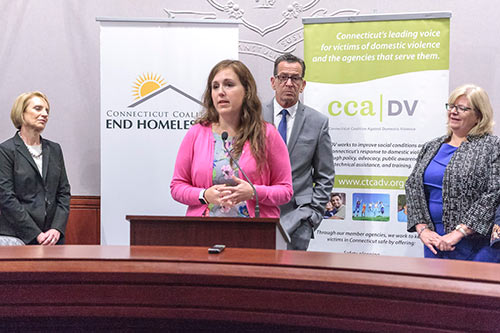Connecticut Senate Democrats Call for End of Forcibly Separating Migrant Children From Their Parents and Zero Tolerance Policy at Border
Members of the Senate Democratic Caucus sent the attached letter today to Homeland Security Secretary Kirstjen Nielsen and Attorney General Jeff Sessions regarding the cruel and inhumane policy of forcibly separating migrant children from their parents when apprehended at the border.
The Honorable Kirstjen Nielsen
Secretary
Attorney General
The Honorable Jeff Sessions
Dear Secretary Nielsen and Attorney General Sessions:
We write to you regarding the cruel and inhumane policy of forcibly separating migrant children from their parents when apprehended at the border. We feel compelled to speak out against this heartless and unconscionable practice which runs counter to the very fabric of American society and Connecticut’s values.
This crisis is a tragedy of this administration’s own making, stirring the echoes of some of history’s darkest hours. And at what cost? The senseless trauma that these children are experiencing will have long and lasting effects. It is why this policy has been rightly condemned by the president of the American Academy of Pediatrics, former first ladies of the United States, at least 75 former U.S. Attorneys, members of Congress and countless others.
Tearing families apart should not be the official policy of the Department of Homeland Security and the Department of Justice. This policy has brought international shame to the United States. In Connecticut, we value immigrants, we have enshrined it in our laws and our public policy because we know that time and again America is at its strongest when we openly accept people from foreign lands; when we view immigrants not as competition, but as brothers and sisters in carrying forward the torch of liberty.
We demand that the Departments of Homeland Security and Justice immediately halt forcibly separating migrant children from their parents and end this zero tolerance policy for undocumented immigrants entering the United States.
Sincerely,
Martin M. Looney
Senate President Pro Tempore
Bob Duff
Senate Majority Leader
Gary Winfield
Senator, 10th District
Doug McCrory
Senator, 2nd District
Marilyn Moore
Senator, 22nd District
Beth Bye
Senator, 5th District
Cathy Osten
Senator, 19th District
Tim Larson
Senator, 3rd District
Steve Cassano
Senator, 4th District
Terry Gerratana
Senator, 6th District
Carlo Leone
Senator, 27th District
John Fonfara
Senator, 1st District
Edwin Gomes
Senator, 23rd District
Joan Hartley
Senator, 15th District
Mae Flexer
Senator, 29th District
Paul Doyle
Senator, 9th District
Ted Kennedy, Jr.
Senator, 12th District
